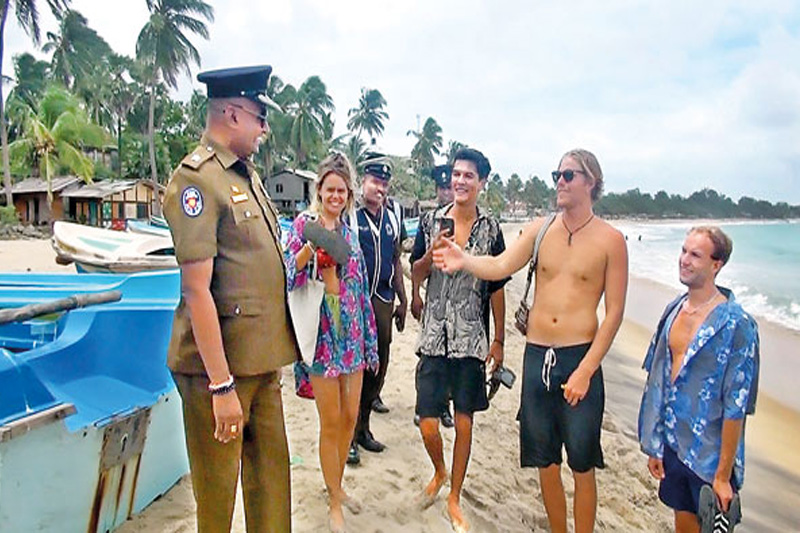
Wide Angle: focus on Tourism under terror threat and amateurism in Governance
- CNL Reporter
- October 29, 2024
- Weekly Political Review
- Tourism, Wide Angle
- 0 Comments
Weekly Political Review
Tourism in Turmoil: Security Threats Challenge Sri Lanka’s Industry Recovery amidst Political Shifts
By Rohana Jith
Sri Lanka has historically seen shifts in power where individuals, driven by personal ambition, have frequently destabilized governments.
As the new caretaker government led by President Anura Kumara Dissanayake (AKD) consolidates power, concerns persist about potential threats to its stability, though immediate dangers seem unlikely.
Political analysts caution that sustaining authority is more challenging than acquiring it, a notion underscored as Sri Lanka approaches upcoming parliamentary elections, where AKD’s influence is anticipated to be strong.
Upon forming a new government, priorities like debt repayment and development projects will likely be the focus. Yet, some experts argue that governing with the same care applied to managing ecosystems—where harmful disruptions are prevented—is critical to ensuring stability and economic growth.
Amid political shifts, tourism has remained a vital sector, showing recovery despite recent visa-related issues under the previous administration. However, recent threats against Israeli tourists at Arugam Bay, though unmaterialized, have prompted visible security responses across popular areas like Ella and Mirissa.

The government has recently faced criticism for its handling of an October 7 security threat, which was only publicly addressed following multiple travel advisories from countries including the United States and Israel.
These advisories, warning citizens to avoid certain areas, have put the tourism industry at risk—a sector already recovering from past crises.
Despite the new government’s reassurances, the industry’s concerns are compounded by the lack of cohesive communication with local stakeholders and foreign diplomatic missions, raising questions about preparedness and the potential impact on Sri Lanka’s broader economy.
In response to a foiled attack aimed at Israeli tourists during a religious event, authorities have increased security in tourism hotspots. Alleged motivations for the attack include protest against recent military actions by Israel in Gaza and Lebanon, highlighting the complex regional influences at play. Minister Vijitha Herath has reassured the public and tourists alike that Sri Lanka is safe, though travel advisories remain active.
With the government still in its early stages, managing security concerns and economic stability are critical. Analysts warn that insufficient strategic planning could impact Sri Lanka’s reputation and economic recovery.
Additionally, local tensions risk flaring, particularly in areas with significant Muslim populations near tourist destinations, which could lead to misplaced blame and further social unrest.
The situation underscores the need for the new administration to establish resilient mechanisms that safeguard Sri Lanka’s political and economic interests.
Sri Lanka, a country accustomed to political upheavals, now faces significant challenges in its tourism sector amidst a recent attempted attack on Israeli tourists.
The new government under President Anura Kumara Dissanayake (AKD) has been proactive, but the threats to tourism—one of Sri Lanka’s essential economic pillars—pose a fresh test to its stability and economic recovery efforts.
With global travel advisories issued from nations such as the United States, the UK, Israel, and Russia, the recent incident has heightened concerns among stakeholders as the tourism industry anticipates its busiest winter season.

Recent Events and Tourism Impact:
The recent week brought a troubling development as intelligence sources uncovered a planned attack targeting Israeli visitors in Arugam Bay, a renowned surfing destination.
The alleged plot, reportedly aimed at a large religious gathering, has placed the spotlight on Sri Lanka’s security efforts as it looks to rebuild its reputation post-pandemic. Following high-profile advisory warnings from multiple countries, Sri Lankan authorities moved quickly to increase security across major tourist spots like Arugam Bay, Ella, Mirissa, and others. Despite reassurances from Minister Vijitha Herath, who oversees Public Security, the government’s response has been questioned for its delayed communication and perceived amateurism, which has amplified concerns within international circles and local tourism sectors.
Political and Security Ramifications on Tourism:
Sri Lanka’s month-old administration is under scrutiny for its crisis management approach as it grapples with this threat amid an impending parliamentary election. The government’s response to the intelligence on the attack has drawn attention from tourism and security analysts alike, who highlight the need for a comprehensive, ecosystem-driven approach to national security that minimizes internal disruptions. The situation underscores the fragility of the tourism sector, which was beginning to see promising recovery indicators despite recent economic setbacks.
Long-Term Considerations and Global Relations:
While Minister Herath emphasized that strengthened measures have been well-received internationally, the delayed disclosure of the threat left Sri Lanka’s tourism industry exposed to potentially avoidable travel advisories.
This has sparked calls for improved coordination between the government, foreign embassies, and tourism stakeholders to ensure timely responses to security concerns. Additionally, the economic toll of these advisories could affect Sri Lanka’s broader recovery, as tourism remains vital for foreign exchange and employment opportunities. Going forward, establishing a resilient and responsive security framework is critical for maintaining both the confidence of international visitors and the economic stability of this island nation.

